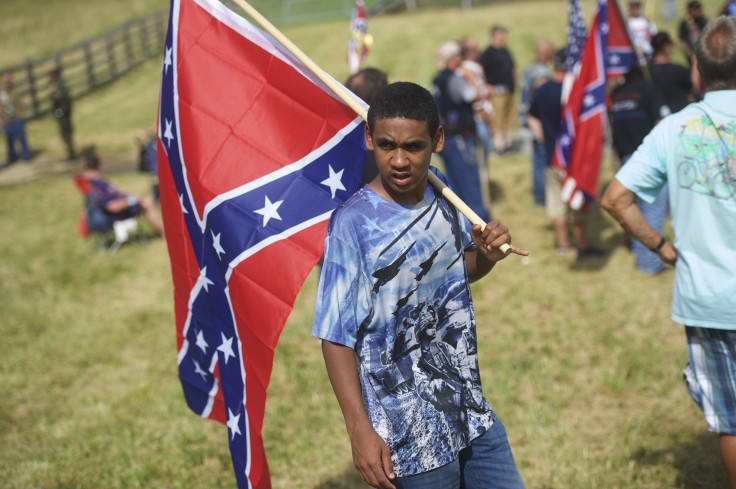Confederate Flag Sales See Spike After Charlottesville Protests

Confederate flags are reportedly seeing a surge in sales. Alabama Flag & Banner, the last Confederate flag retailer in the United States, claims that the controversy from Charlottesville, Virginia, has benefitted its sales.
The small shop has seen an increase in sales following the protests in Charlottesville over the removal of Confederate General Robert E. Lee's statue, according to CBS News. However, sales will likely remain steady as the push for the removal of more Confederate monuments occur, CBS News reported.
Belinda Kennedy, the owner of Alabama Flag & Banner, spoke with International Business Times Friday about the sales spike she's seen within her Huntsville, Alabama, business.
"By and large, the comments I hear from customers coming into our store, over the phone or by email are buying flags in order to offset the small minority who are demanding the removal of monuments, changing names of streets, schools, and buildings, wanting to deface mountains, and general trying to revise history," Kennedy told IBT. "The sales we are seeing are from all 50 states and several different countries."
"I have no intention of stopping our manufacturing," Kennedy said. "We are currently the only U.S.-based manufacturer of the flag. Our customer base includes mom-and-pop shops that do not want to sell China-made products but do want to continue to carry a full line of historic flags."
She added, "We are their only source for some of these flags. I do not see the demand for these flags decreasing any time in the near future."
The sales boost shouldn't come as a surprise. Retailers nationwide have halted the production of Confederate flags because of push-back from people in opposition to it. Convicted shooter Dylann Roof's 2015 rampage at the Emanuel AME Church in Charleston, South Carolina, became a cause of concern for major retailers. This incident led retailers to rethink selling Confederate flags to consumers.
Amazon, Walmart, Etsy, eBay and Sears announced its intentions to place a ban on the sale of Confederate flags following the Charleston controversy. A Google spokesperson told Recode in 2015 that the tech company also planned to remove the Confederate flag from advertisements and Google Shopping.
The removal of Confederate monuments will likely move forward. A list of government officials in support of the removal of Confederate monuments is expanding country-wide, according to Reuters. Mayors of Baltimore and Lexington, Kentucky, intend to follow through with removal plans. Officials in Memphis, Tennessee, Dallas and Jacksonville, Florida, also announced its plans to push for the removal of Confederate statues.
The flag has served as a symbol associated with racism for many. However, those in support of the flag advocate its significance in U.S. history. Confederate flag enthusiasts have had a harder time obtaining it because of the nationwide production halt, as a result.
The removal of Confederate statues nationwide has likely increased the demand for shops like Belinda's to cultivate more flags.
"We started having an influx in business and none of the major manufacturers were willing to sell the stock they had — they weren't willing to continue production on Confederate flags," Kennedy told AL.com in a 2015 interview. "My responsibilities to my customers is to fill their needs when they want it and I had customers wanting it. I wasn't going to turn them away as I felt I had been turned away. We just decided to start cranking them out of our presses, cutting and sewing."
Kennedy added, "It's no different from a Betsy Ross flag, a Bennington flag, [or] any of the historic flags. It's simply a historic flag. It's not hate, it's history. It's a symbol of things that happened in the past and hopefully, we've learned from the past. The people that are making it a racial issue are pushing an agenda."
Follow me on Twitter @dory_jackson
© Copyright IBTimes 2024. All rights reserved.












